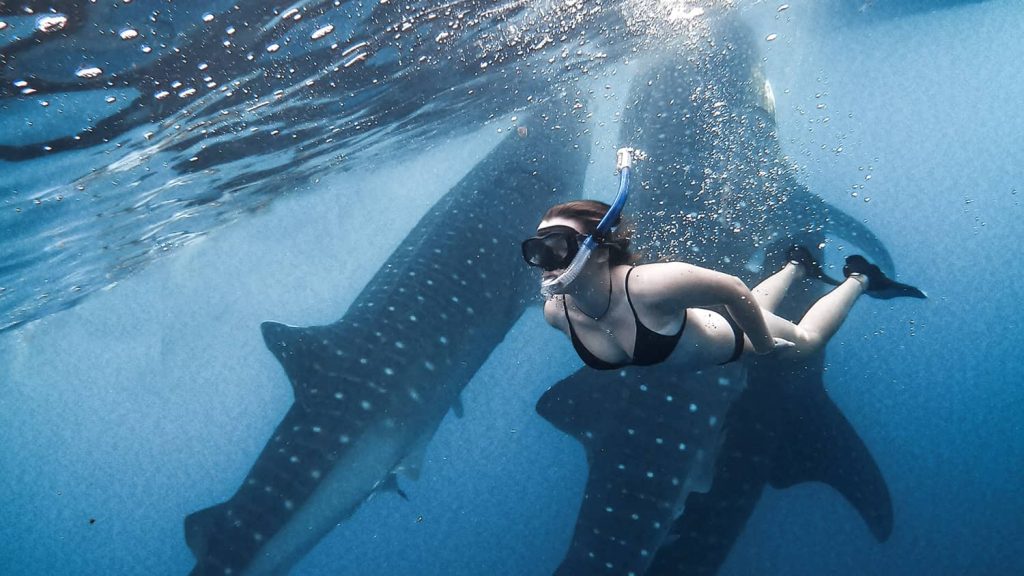There’s a kind of silence that only the ocean knows. It’s not the absence of sound — not really. It’s the presence of something bigger. A weightless stillness that wraps around you the moment your feet leave the boat and you slip beneath the surface.
That silence was the first thing I noticed in Saleh Bay.
The second was the presence of something enormous — calm, steady, and strangely elegant.
A whale shark.
It moved like a shadow made of sunlight. Like a mountain pretending to be a fish. And in that moment, suspended in the clear blue, I understood something I hadn’t known before. Not in words. In feeling.
We weren’t just visiting the sea. We were entering a sacred space.
How It All Began
I didn’t come to Sumbawa expecting a spiritual experience. If anything, I came to cross something off my bucket list. I had read stories about the whale sharks of Saleh Bay — stories of these enormous, gentle fish swimming just beneath the surface, unbothered by boats or people.
I imagined excitement. Thrill. Adrenaline.
But what I found instead was peace. Deep, hushed, all-encompassing peace.
Saleh Bay, tucked quietly between the arms of Sumbawa Island, isn’t a place that screams for attention. It doesn’t need to. The bay whispers. And if you listen, it will tell you everything.
I joined a small group on a morning tour. No crowds. No engine roars. Just quiet voices, coffee breath, and sun warming the sides of our necks.
Our guide, a local man named Arif, explained how the community here protects the whale sharks. “They are our pride,” he said. “And our responsibility.”
The First Glimpse
About an hour into the journey, Arif gestured quietly to the side of the boat. I leaned over — and there it was.
A slow, deliberate ripple.
Then a fin.
Then the full body, gliding just beneath the water like a gentle submarine.
It was the first giant whale shark encounter of my life, and I couldn’t speak. I couldn’t even move for a second. I had seen photos before. I had watched documentaries. But nothing prepared me for being this close to something so large, yet so… still.
They call them the “gentle giants,” and now I knew why.
We slid into the water slowly. No splashing, no diving. Just breath and float.
The whale shark didn’t flinch. It just kept moving, as if we were part of the sea now — guests in its home.
A Moment You Can’t Recreate
I’ve done a lot of snorkeling. I’ve seen manta rays in Nusa Penida, turtles off the Gili Islands, even dolphins in Bali.
But this was different.
There was no rush. No frenzy. No chasing or baiting or shouting across the boat.
Just presence. Just being there — next to this enormous creature, matching its rhythm.
It’s what I now think of as a truly tranquil whale shark experience. And it changed the way I think about the ocean entirely.
There’s no show in Saleh Bay. No performances. Just the sea, and the slow dance of its largest residents.
If you’re seeking a thrill, you might be underwhelmed.
But if you’re seeking stillness, clarity, a kind of awe that roots itself in your chest — then this is where you need to be.
Swimming With Whale Sharks in Saleh Bay
People often ask me what it’s like, swimming with whale sharks in Saleh Bay. I never really know how to answer.
Because how do you describe a moment where time folds in on itself? Where everything you’ve ever worried about — emails, deadlines, traffic, bills — dissolves into saltwater and light?
It’s quiet. Not silent, but sacred.
You hear your own heartbeat through your snorkel. You feel your breath echo against your mask. And beside you, this ancient creature moves with a confidence you can’t fake.
The whale shark sighting in Indonesia wasn’t just about the animal. It was about what that animal invited us into: a different pace, a deeper presence, a reminder that the world is not ours to dominate — but to honor.
More Than Just a Tour
What I appreciated most about this journey was the honesty. This wasn’t some heavily commercialized attraction. It was community-based. Human. Real.
Arif explained how the tours started small. Local fishers began noticing patterns — when the whale sharks came, how long they stayed, what they responded to. Then came the researchers, the conservationists, the cautious tourism operators.
Over time, what emerged wasn’t just an activity. It was a shared mission: to protect the Saleh Bay gentle giants and educate visitors about their importance.
That’s what drew me in the most. The whale sharks of Saleh Bay weren’t being used for entertainment. They were being respected. Observed. Celebrated without being disturbed.
If you want to learn more about the program or plan a visit, check out the official site for the <a href=”https://whalesharksalehbay.com/”>Saleh Bay whale shark tour</a>. It’s where I started, and where I plan to return.
What Stayed With Me
It’s been months since I returned from Sumbawa, but I still feel it sometimes.
That silence.
That gentle shadow beneath the water.
That moment where I floated, alone but not alone, in the presence of something far older than I can imagine.
I’ve traveled to many places. But only a few have left a mark like this. Not just on my memory, but on how I move through the world.
I walk slower now. I notice more. I pay attention to birdsong and wind.
And when things get too noisy — in my head, in the world — I close my eyes and return to Saleh Bay.
To the water.
To the silence.
To the whale shark beside me.
